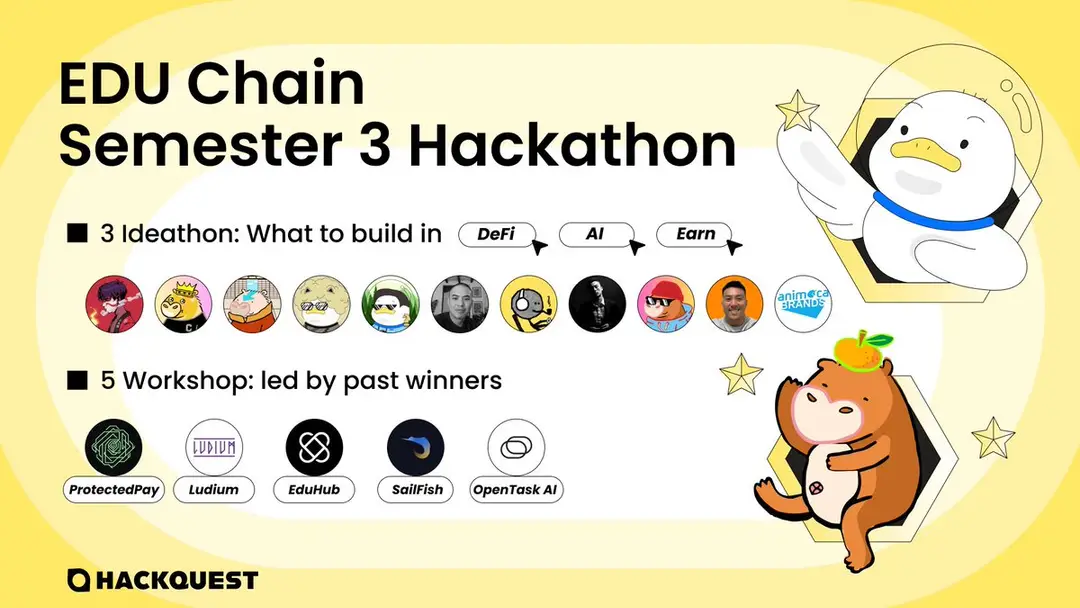Quay lại
EDU Chain Semester 3 Hackathon Ideathon 3: What To Build In EARN Now Recap
Events
By HackQuest
Apr 3,20254 min read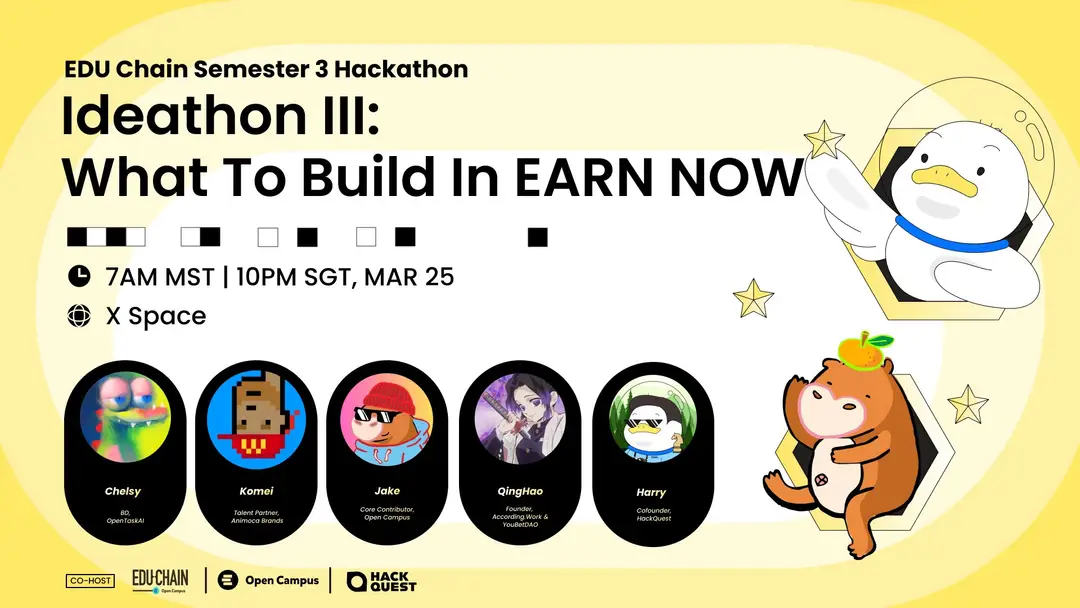
With the launch of the EDU Chain Semester 3 Hackathon, HackQuest hosted an insightful Ideathon featuring experts from OpenTaskAI, Animoca Brands, Open Campus, YoubetDAO, and HackQuest, including Chelsea, Komei, Jake Hughes, Qinghao, and Harry Zhang, to explore applications that help people earn within the EDU Chain ecosystem. The session covered the rationale behind focusing on earning opportunities, examples of successful projects, and innovative ideas for new applications.
Panelists discussed how the "earn" component completes EDU Chain's learn-own-earn blueprint, providing critical product-market fit for on-chain learning credentials. They showcased existing projects like OpenTask AI, a decentralized marketplace for AI freelancers, and YoubetDAO's system for incentivizing open-source contributions through on-chain tracking. Speakers highlighted how traditional recruitment and verification processes are ripe for disruption through blockchain technology, with tokenized credentials potentially eliminating issues like fake candidates and lengthy background checks.
The discussion explored innovative concepts including tokenizing freelancers' time, peer-to-peer payment systems using Open Campus IDs, prediction markets for recruitment, and agent-based infrastructures that help users monetize their skills. Panelists emphasized the importance of bringing existing platform data on-chain to build comprehensive reputation systems and the necessity of integrating AI capabilities even in applications primarily focused on earning mechanisms.
Participants were encouraged to join the EDU Chain Semester 3 Hackathon, with speakers offering practical advice for success, including leveraging Vibe Coding to rapidly develop prototypes. They emphasized the importance of solving real problems for education stakeholders while contributing to EDU Chain's growth in terms of TVL, unique active wallets, and transactions. The panel highlighted resources available to builders, including the Open Campus ID infrastructure and the incubator program that helps transform promising hackathon projects into sustainable businesses with real-world impact on how people learn and earn in the Web3 ecosystem.
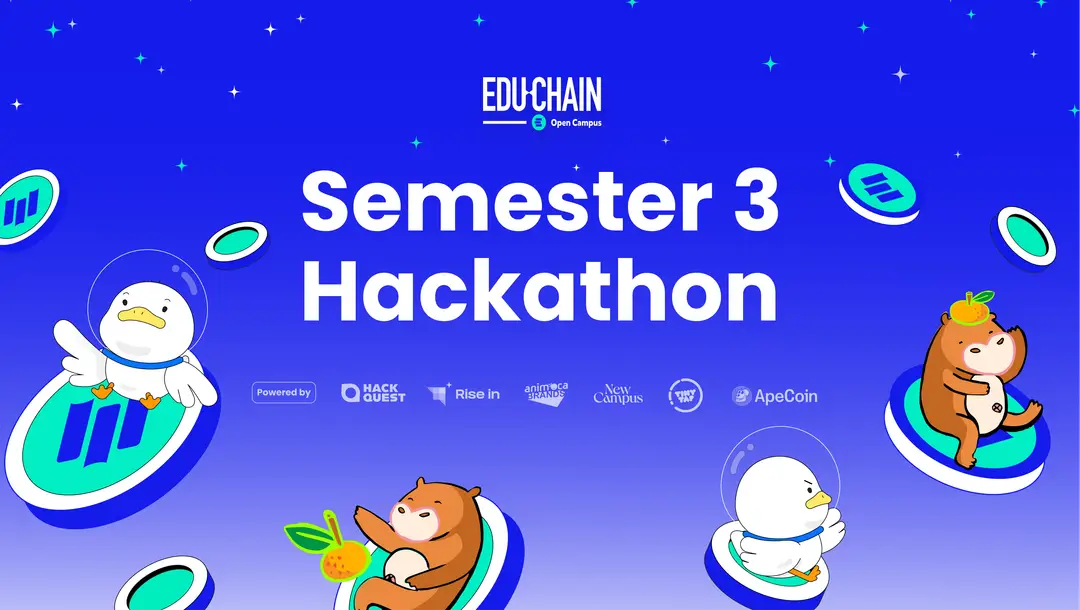
Key Takeaway
●Learn-Own-Earn Blueprint: EDU Chain's ecosystem is built on a three-part journey where users learn (through content or contribution), own their achievements on-chain, and then earn through applications that recognize these credentials, creating a complete cycle that drives adoption.
●On-Chain Credential Verification: The transition from siloed, organization-specific credentials to publicly verifiable on-chain credentials solves major problems in recruitment, including verification challenges, fake candidates, and the time-consuming reference checking process.
●Tokenized Time and Skills: Freelancers can tokenize their time and skills, allowing companies to purchase hours upfront, providing freelancers with immediate payment while giving businesses guaranteed access to talent when needed - particularly valuable for specialized skills like AI development.
●Data-Driven Reputation Systems: Successful earn applications leverage existing platform data (GitHub contributions, Twitter engagement, course completions) and bring it on-chain to create comprehensive reputation profiles that unlock earning opportunities without requiring users to build reputation from scratch.
●Peer-to-Peer Educational Economy: Applications enabling students to pay each other directly through their OCIDs create opportunities for peer tutoring, knowledge sharing, and collaborative learning that generate income while reinforcing educational goals.
●Prediction Markets for Talent: Novel approaches like recruitment prediction markets where users bet on candidate success could transform hiring by crowdsourcing evaluation while creating earning opportunities for those with good judgment about talent potential.
●AI Integration Necessity: Even applications in the "earn" track must consider AI integration for long-term viability, as the nature of work evolves toward AI-assisted roles, creating opportunities for economic mechanisms around AI bot creation and training.
Introduction
Jake: I'm Jake, one of the core contributors at Open Campus and also work in a marketing role at Animoca Brands. I'm looking forward to sharing ideas around what we can build on EDU chain in terms of applications.
Qinghao: I'm Qinghao, founder of YoubetDAO. We build a system that automatically traces all the GitHub contributions to incentivize them.
Komei: I'm Komei, part of the recruitment team of Animoca Brands. I work with stakeholders on the investment strategic partner teams and the Digital Asset Trading team.
Harry: We do have one more speaker actually joining later from OpenTask AI, which is also Open Campus incubator project. They were cohort one and one of the OG projects and winners of the hackathons. Their BD Chelsea will be joining us.
Why Focus on Building Applications That Help People Earn?
Jake: We have a learn, own and earn blueprint for EDU chain. We want people to come into the ecosystem and learn, then own the achievements from these learning experiences on chain, and finally apply that academic record to find a new job or earning experience.
Although we are an education focused ecosystem, to complete the loop for students, this earning piece is crucial. If we build a thriving ecosystem of applications that help people earn, we'll create real product market fit for on-chain learning credentials. If people can use these credentials to find jobs easier, join hackathon teams, or launch startups, we'll find true market fit for these on-chain credentials.
Examples of Earn-Based Projects
Qinghao: Recently, I learned about Bitskwela, an educational program for Web3 projects in the Philippines, operating within the EDU Chain ecosystem. Shan, who connected us, informed me about the program and the large number of students involved. Within the EDU Chain framework, which functions as a "learn track," Shan shared an insightful perspective from the students. They recognize that earning is the final stage of education, understanding that the primary goal of education is to generate value. This value, in turn, empowers individuals to earn and create a tangible impact on the real world. They are keen to connect their students with our system to facilitate their earning opportunities.
We're building a system that traces GitHub contributions. We care about open source contributions, and we believe they make impact. But because they're open source, people use them freely, so contributors don't earn anything. Especially in Web3, all projects are open source. We want to incentivize open source contributors by tracking their contribution on chain. If people rely on it, they can donate to it.
Chelsy: Our platform is a decentralized freelancer marketplace focusing on AI and AI-related talent. The freelancing market shows high growth, and integration between AI and business is increasing. Enterprises show high adoption of freelancing platforms like Fiverr or Upwork, with interest in AI-related services.
Young generations have more intention to learn innovative things, with incentive to learn AI models. We want to build a bridge between enterprises willing to use AI freelancers and young people willing to learn AI skills and earn by providing these skills.
Traditional Web2 freelancer markets charge high commission fees with fiat transactions. People are willing to use Web3 payments because they're decentralized and transparent. We're building a Web3 freelancer platform to help people use cryptocurrency to buy services more easily.
Komei: For recruiters, our commodities are human beings. Everyone doing hackathons is the commodity and asset. Our goal is finding relevant candidates for roles, with a lot of time spent on sourcing and vetting candidates.
There isn't an on-chain verification aspect from a recruiter standpoint yet. If we could decentralize these products - turning skills into digital tokens verified by universities, employers, and peers - and store credentials securely for employers to check quickly, that would be valuable. These tokens could be stored in digital wallets, with value based on market demand for your skills and reputation.
Employability Data and Credentials
Jake: The piece around employability data for credentials is interesting. Our Open Campus ID product is facilitating recording learning achievements on chain. What we haven't tackled is recording job data on chain to unlock future earning opportunities. Tokenizing reference data would be useful to ensure it's verifiable and hasn't been gamed.

Source: Tectum.io
Komei: Reference checks and background checks are part of HR processes. Sometimes references don't do well, and we have to rescind offers. With a solid tokenizing foundation, we could avoid these issues.
Jake: You mentioned trading employability tokenized assets. I had an idea about a DeFi protocol allowing students to trade ownership of employability credentials. How would trading these credentials be useful for recruiters?
Komei: This might take away 60-70% of my job, but not 100%. The trading aspect would be trading your abilities to help firms do well - freelancers trading their time. Time and experience are the absolute assets. Nothing can replace the human touch in recruitment.
Jake: That's an interesting idea - freelancers tokenizing their time so companies can pay for hours of that freelancer per week. Freelancers get paid upfront, and companies secure the resource when needed.
Chelsy: I want to give some feedback about the credentials topic. I am currently also working in traditional finance institutions. In our company, we also build a badge system where employees can join and learn courses. The courses have topics like finance, sustainability, even Web3 and crypto. When you finish the related courses and get some exams, you will get credentials just like tokenized credentials. But these credentials can only be used or recognized within the organization. You cannot use them outside the organization, and other people outside cannot see the credentials you have.
If there is an open and decentralized platform that people from all organizations can use to learn courses they're interested in or to develop their skills and professions, and all of the credentials they get from this platform can be recognized in the open market - you can use the credentials when you do job hunting or recruiters from outside can recognize the credentials you got - I think it is very meaningful. As the labor market is very large, this kind of ecosystem will be very strong and have high potential growth in the future.
Komei: You're absolutely right. There are courses out there like Coursera that give you a certificate. I was looking for a full stack developer, and during interviews, I found a case where the name just did not match the face. I realized there are fake candidates. Back in 2021, there were a lot of fake candidates trying to enter crypto firms to exploit certain situations.
With university verifications and with Open Campus's connections with universities, that's absolutely a very core, standard verification that can be incorporated to be the first verification for their education or degrees.
Qinghao: On the accreditation part, if you want to build a Web3 application, especially working in a decentralized way for freelancers, a key question is how do you find qualified freelancers? The answer is you can find it from data that already exists. People mentioned Coursera for education, and in the education ecosystem itself, there are already a lot of awesome education platforms. Maybe you can provide some Web3 certification and make it on-chain so it will always be public, everyone can verify it, and it can be easily integrated with a lot of dApps.
I remember EDU Chain really provides something like OC Achievement, and we can rely on that. For example, what we're building traces GitHub contributions. If you want to find a qualified developer, you can use GitHub data, and we can move that data on-chain using OC Achievement or OCID for verification. If you are working on a system that helps people hire KOLs or marketing professionals, maybe you can use Twitter as your data source. In different cases, you can find some platforms that already have a lot of data. If you can build a system that can analyze this data and find it with some on-chain infrastructure, I think that would be a good idea.
Innovative Ideas for Earn Applications
Jake: I love that idea, Qinghao. Bringing existing platform data on-chain to help students build reputation is a good problem to tackle.
I have an idea for a recruitment prediction market where users bet on who will get a job and earn EDU tokens for correct predictions. This could help employers by outsourcing decisions to a community. We'd pair on-chain learning records with candidates, make it public, and let the community decide based on their data and history. It would be a fun part of the recruitment process, though it would require publicizing shortlisted candidates.
Komei: That's fascinating. It's similar to when recruiters say, "I don't want commission, I want a percentage of what this person makes" when hiring traders. You could bet on someone's future performance and earn a percentage of their success.
Chelsy: During our platform operation, we found market recognition is the key issue. This depends on the source of courses, credential integrity, and the true skills people have. It's a cycle - only when people with credentials really have skills will the value of tokenized skills increase.
Qinghao: I really like Jake's idea. It's so creative and interesting. In a hackathon, an idea like this is very cool and interesting. It has a big advantage. Even if sometimes your product is not really production-ready, a cool idea is a killer in a hackathon. So go for it.
Chelsy's insight is also valuable. In our system, we also have a similar credential system based on what users do on the platform. My idea is that data is very important. Sometimes you use data from a third-party platform, analyze it, and use it on-chain. Sometimes the data is in your platform, and you definitely should use that too.
I think AI has always changed everything. In the EDU Chain Hackathon, there is an AI track, but AI still has a big impact in every track. Recently we met with a lot of investors, and one of their challenges was, "Qinghao, I like your idea, but maybe in the next two or three years, all the developers won't be developers - they'll just be AI agent callers or they'll just be asking AI to do the work."
If you want to do something long-term, to solve problems in the next two years, not only the recent future, you definitely should consider AI in your platform. There's a platform called MyShell that recently launched on Binance. I started following them at a very early stage. What they do that's really cool is that in the Web2 world, there are already a lot of AI platforms with economic mechanisms to make people earn by creating AI bots or training AI. At that time, AI wasn't that popular, but people could earn by using AI technology.
If you bring some AI and you don't go for the AI track but you go for the earn track, it will also give you an advantage. Maybe you can check MyShell. In crypto AI, if you set some economic mechanism on that, some crypto-native economics, it's not that hard, but it will be super useful.
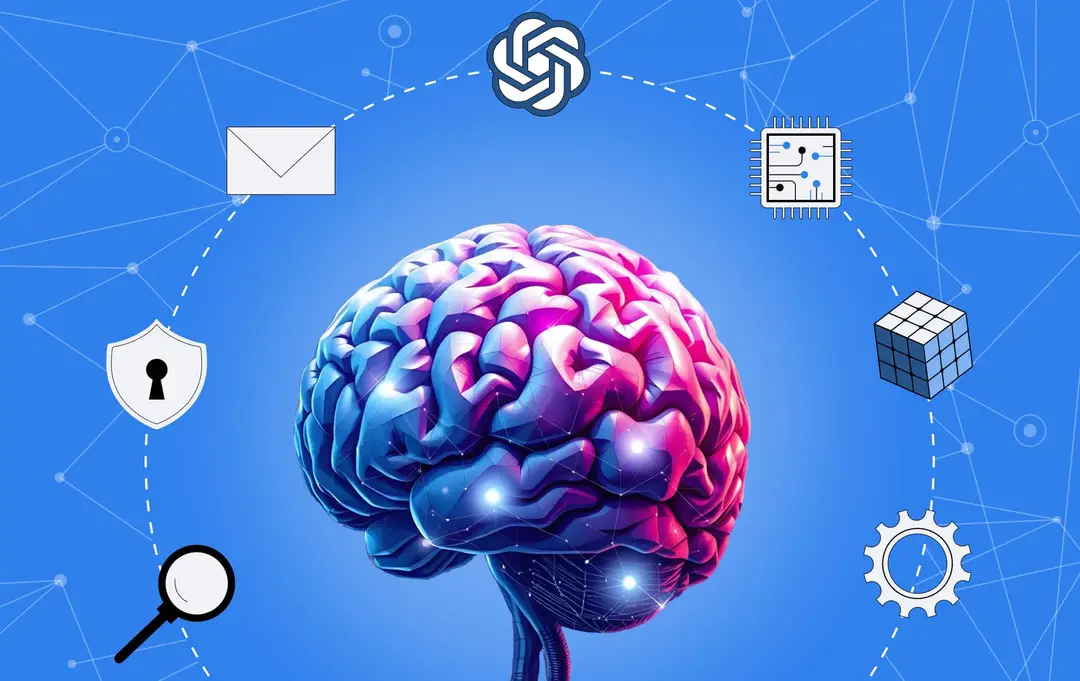
Source: BotsCrew
Project Idea Sharing from Participants
Devik: We're building a payment infrastructure for OCIDs where students can pay each other through their OCID. For example, with devik.edu, anyone can send me payments to my OCID.
We're also creating an agent infrastructure where students can create their own agents. If I follow a Twitter channel, I can create a Twitter agent using EDU tokens to fetch specific posts and gather data. The transaction happens through EDU tokens. In simple terms, this is something that we are building. It's been a week since it's happening, and I think it'll be completed in another one or two weeks.
Jake: I love the peer-to-peer payments idea. On top of this, we could build a peer-to-peer tutoring service where students earn EDU by teaching other students - bringing that entrepreneurial tutoring model on-chain. If there could be a layer on top of that where you can facilitate kids in high school or students at university who are a little bit further ahead than other students, if they can start tutoring other students and getting paid in crypto for that, I think that would be a cool product. There was always that one kid at school that was entrepreneurial and would charge money for doing people's homework. Just bringing that on-chain and facilitating that with products like what Devik is thinking of building could be a layer on top.
Komei: From recruitment, a P2P referral system would save time. If Devik refers someone for a job, it's vetted, and we can pay Devik in crypto. This builds trust in Devik's referrals based on his verification history and accumulated tokens. Just touching on the AI aspect of things, there are application tracking systems called ATS where AI is used, but we'd love to see new interesting things that can parse or scrape through CVs, check out the key points, and refer interesting candidates just by simple job descriptions.
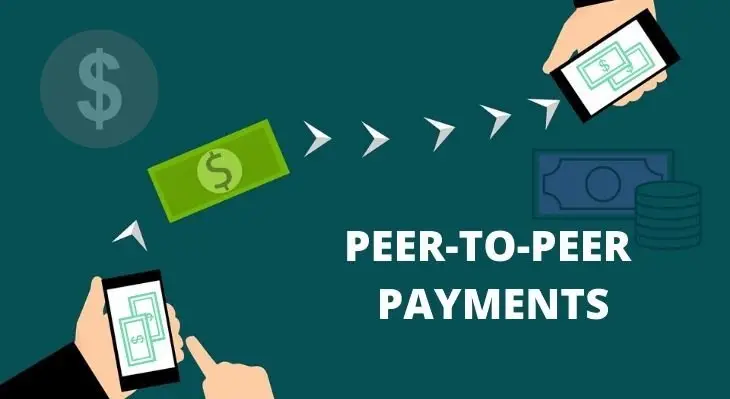
Source: WisdomPlexus
Chelsy: For the credentials, we also build a badge system where employees can learn courses. When you finish the related courses and pass exams, you will get credentials just like tokenized credentials. But this kind of credential can only be used or recognized within the organization.
If there is an open and decentralized platform that people from all organizations can use to learn courses they're interested in or develop their skills, and all of the credentials they get from this platform can be recognized in the open market - you can use the credentials when job hunting or recruiters from outside can recognize the credentials you got - I think it is very meaningful. As the labor market is very large, this kind of ecosystem will be very strong and have high potential growth in the future.
EDU Chain Roadmap
Dezzer: What is your roadmap plan for this year 2025? Can you share with us?
Jake: For 2025, we'll continue running hackathons to bring more developer talent to build products for EDU chain. This increases TVL, unique active wallets, and transactions - all important for a healthy blockchain ecosystem.
A core part of the roadmap is Open Campus ID, rolling it out to more dApps and builders with more features and capabilities. We're also actively speaking with exchanges to get EDU listed more widely, bringing more people into the ecosystem.
Bubble: I've been wanting to participate in HackQuest and whatever is going on there. I've been reading a lot of information about what you guys are doing. I've seen a lot of tweets, but as someone that has no experience as a developer, how is it that I can get involved? Where do I start from?
And there's been a part of HackQuest, would I just learn to be a developer on EDU chain or just learn to be a developer generally? That's my first question. Second question is, when is the PFP collection coming? I'm seeing Harry, I'm seeing Wycliffe, and I'm seeing Whiteheart's tweets, their PFP, and it looks really amazing.
Harry: For non-developers wanting to participate, HackQuest helps you become a developer. If you want to get more technical, HackQuest is a path for it. EDU chain will be a great ecosystem to explore. EDU chain is a great ecosystem to explore. I recommend leveraging vibe coding to build projects. I highly recommend building prototypes using different tools powered by AI to get started there. We have tried building standalone projects in 2-3 hours. You can have a project with a functional UI with deployed contract in a day if you leverage Vibe Coding well enough. As long as you understand the logic, that's something you can get started on exploring.
Regarding the PFP, it's actually only for core team right now, the PFP and our highest level of community advocates. We call them senators. There's only about 30-40 of them right now. Maybe down the line, it will happen.
Thanks everyone so much for sharing your ideas. Hopefully you find this session to be helpful.
Stay tuned for more online events 👇
